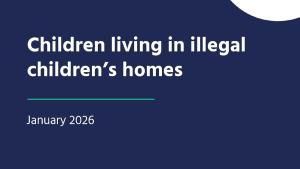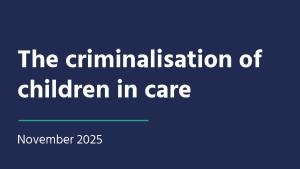As Children’s Commissioner, I have a special responsibility to children living in care or away from home. That is not just a responsibility defined by legislation, but one that I feel personally.
It was a big part of my motivation for taking on this role nearly five years ago, after a 30-year career as a teacher and headteacher. I was part of the great wave of education reform that transformed the outcomes for so many children. The valuable role of school in developing a child’s social, moral, spiritual and cultural character was widely recognised and – relative to other children’s services – they received significant investment.
As a result, schools got better, standards rose, and outcomes improved for many children. But at the same time, I saw how it failed the handful of children we consider our most vulnerable, in part because those reforms underestimated the importance of wider support services.
My recent School Census acknowledges this same truth. I asked every school leader in England what they know about the needs of their children, what challenges they are facing in meeting these, and what their pastoral offer is. More secondary schools (59%) were worried about the funding of wider services than they were about their own funding (51%). The issues they told me they worry most about are not those considered a school’s ‘core business’ – curriculum, attainment – but instead those which go beyond the school gate, such as attendance and children’s social care.
The findings from my Census bring me back to my great motivation, first as an educator and now as Children’s Commissioner: we must work harder to reach those children. Those children for whom a great education, brilliant teachers and learning important life skills can often be the most impactful, but by themselves are not enough. Those children for whom even getting to school in the morning is a challenge: from not being safe at home, or living with domestic abuse, to being homeless or in temporary accommodation, to having complex health needs or seeking asylum.
For these children, who face barriers in attending school, engaging in lessons, and attaining, support from a collaborative group of services across education, health and care is essential.
In recent years, there have been myriad reforms across the children’s social care system in England, starting with the 2022 independent review of children’s social care. But rather than a wholesale re-imagining of what great care can and should be, implementation has been a piecemeal, piloted roll out – bringing some positive change to some children. That’s far from the bold ambition and deep commitment needed to make changes for every child to excel.
More than 29,000 children in care currently live in local authorities judged as less than good by Ofsted – that could and would never be tolerated in schools. It is simply not good enough.
It is deeply concerning for the safety and wellbeing of the one in six children who will have involvement from children’s social care at some point in their lives. But as my School Census makes clear, as well as my work over the past five years on attendance, it is also deeply concerning for their educational outcomes. Without wholesale reform to children’s social care, there is a ceiling on how far any attempts to close educational gaps and improve attainment can go.
Children’s social care can no longer be seen as the junior partner when it comes to improving children’s lives. The many thousands of dedicated professionals working in care roles have been telling us this for years. The love and care they provide to children whose lives are complicated, and often marred by trauma, far too often flies under the radar. Around the country there are brilliant programmes, led by brilliant people, quietly but determinedly transforming children’s lives. The challenge is how to model this everywhere.
We are at a critical juncture for children’s services, with reforms underway across children’s social care, health, and education. Children’s social care must receive the same ambition and attention. It is not more marginal, or less important simply because fewer children will have direct involvement with it. The fact that it only touches the lives of children who are more vulnerable makes it more, not less, important to get right.
Every child deserves adults in their life who are ambitious for them and a coherent plan set out by the services supporting them to help them achieve their potential. We cannot leave it to chance. It requires hard work and bold thinking. It will require a shared vision across the country of what ‘good’ looks like within all services – and a refusal to allow anything less for these children.
Above all, it will require children’s voices and experiences to be listened to and placed at the centre of urgent reform. Children in care, or with a social worker, must no longer be an afterthought to any serious public sector reform.





